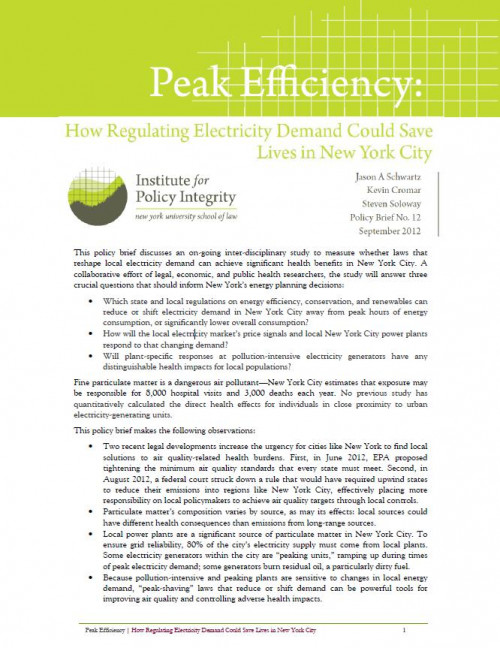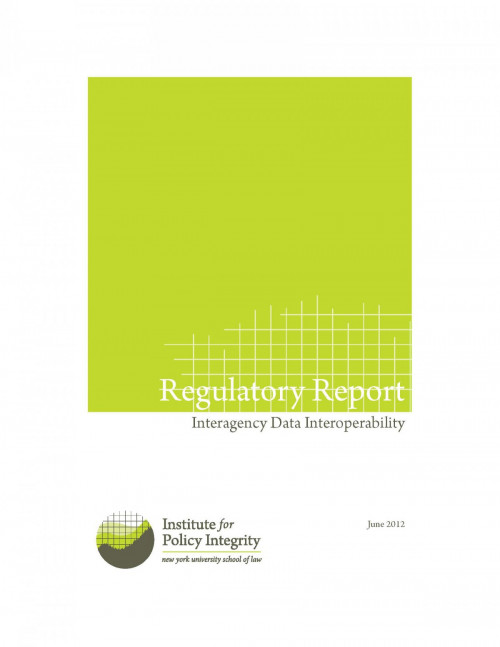-
Industry Files Brief Opposing EPA Mercury Rule
Representatives of the fossil fuel industry have urged the D.C.Circuit to ignore standard methods of cost-benefit analysis and strike down the EPA’s Mercury and Air Toxics Standards. Not only does this EPA regulation reduce mercury emissions from coal- and oil-fired power plants, it also reduces harmful particulate matter air pollution, or soot. The benefits stemming from the rule far outweigh its costs, with net benefits to the American people estimated to be as much as $80 billion per year.
-
Comments on Mortgage Servicing Rules
In compliance with the Dodd-Frank Act, the Bureau of Consumer Financial Protection has proposed mortgage regulations to address many of the concerns from the subprime mortgage crisis. Policy Integrity submitted comments to the Bureau on two mortgage servicing rules: (1) the RESPA Rule, which lays out requirements for how servicers must interact with the homeowners whose mortgages they service and (2) the TILA rule, which describes certain disclosures that mortgage servicers must send to their customers at particular points.
-
Letter to EPA on water quality permitting
Policy Integrity submitted a letter to the EPA on its upcoming rulemaking regarding water quality permitting. The letter makes recommendations on improving the efficiency of EPA’s implementation and enforcement of the Clean Water Act.
-

Peak Efficiency
How Regulating Electricity Demand Could Save Lives in New York City
This policy brief discusses an on-going inter-disciplinary study to measure whether laws that reshape local electricity demand can achieve significant health benefits in New York City. A
collaborative effort of legal, economic, and public health researchers, the study will answer crucial questions that should inform New York’s energy planning decisions -
EPA and DOT Finalize 2017-2025 Fuel Economy Standards
The DOT and EPA finalized fuel efficiency standards today for cars and light duty trucks, increasing fuel efficiency to 54.5 mpg by Model Year 2025. The agencies calculate that consumer savings under the new standards will be comparable to lowering the price of gasoline by $1 per gallon by 2025.
-
Federal Court Overturns Cross-State Air Pollution Rule
The D.C. Circuit overturned an EPA rule that would have dramatically cut down interstate air pollution, ruling that the agency had exceeded its authority devising regulations affecting more than two dozen states.
-
Comments to the US Sentencing Commission on Sentencing Guidelines
Policy Integrity sent our report, Balanced Justice, to United States Sentencing Commission in response to its call for public comments on possible priority issues for forthcoming amendments to the Sentencing Guidelines. The guidelines are used to set a uniform sentencing policy for individuals and organizations convicted of felonies and serious misdemeanors.
-

Regulatory Report
Interagency Data Interoperability
This report shows what could be accomplished if straightforward changes were made to improve the way agencies interact. By sharing data, using the same metrics and coordinating on target populations, agencies could improve the impact of social services and stretch every tax dollar.
-
Comments to EPA on Adding Flexibility to Greenhouse Gas Rules
Sadly, the idea that market forces can drive down the cost of public health regulation has lost favor in the past few years. The EPA’s long-delayed, first-ever greenhouse gas standards for new power plants (New Source Performance Standards or NSPS) offers an opportunity to make market mechanisms cool again.
-
Comments to DOE on Retrospective Review
Policy Integrity submitted comments to the Department of Energy (DOE) on its plan for periodic retrospective review pursuant to Executive Order 13563, which asks agencies to consider how best to promote retrospective analyses of existing rules. We found that the DOE’s plan could do a better job of updating and expanding regulations to enhance net benefits rather than just minimization of compliance burdens and administrative cost cutting, which the plan largely focuses on.
